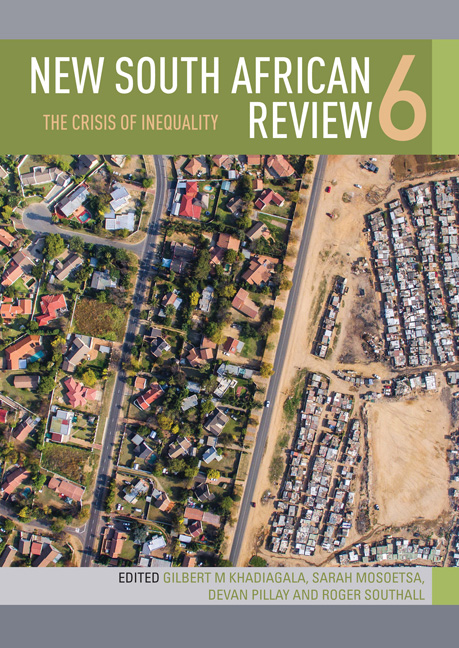Book contents
- Frontmatter
- Contents
- List of tables and figures
- INTRODUCTION: The global crisis of inequality and its South African manifestations
- PART 1 INEQUALITY AND CLASS: POLARITIES AND POLICIES
- PART 2 THE POLITICS OF INEQUALITY
- PART 3 SOCIAL DIMENSIONS OF INEQUALITY
- PART 4 LAND AND ENVIRONMENT
- CHAPTER 12 Spatial defragmentation in rural South Africa: A prognosis of agrarian reforms
- CHAPTER 13 Mining, rural struggles and inequality on the platinum belt
- CHAPTER 14 Challenging environmental injustice and inequality in contemporary South Africa
- CHAPTER 15 The geography of nuclear power, class and inequality
- Contributors
- Index
CHAPTER 12 - Spatial defragmentation in rural South Africa: A prognosis of agrarian reforms
from PART 4 - LAND AND ENVIRONMENT
Published online by Cambridge University Press: 23 March 2018
- Frontmatter
- Contents
- List of tables and figures
- INTRODUCTION: The global crisis of inequality and its South African manifestations
- PART 1 INEQUALITY AND CLASS: POLARITIES AND POLICIES
- PART 2 THE POLITICS OF INEQUALITY
- PART 3 SOCIAL DIMENSIONS OF INEQUALITY
- PART 4 LAND AND ENVIRONMENT
- CHAPTER 12 Spatial defragmentation in rural South Africa: A prognosis of agrarian reforms
- CHAPTER 13 Mining, rural struggles and inequality on the platinum belt
- CHAPTER 14 Challenging environmental injustice and inequality in contemporary South Africa
- CHAPTER 15 The geography of nuclear power, class and inequality
- Contributors
- Index
Summary
South Africa is the most unequal country in the world, and the gap between rich and poor is growing. In 2013, the richest 4 per cent of South African households earned 32 per cent of the country 's total income, next to 66 per cent of households receiving less than a quarter (21 per cent) of all income (Visagie 2013). One of the core indicators of South African inequality and poverty is unequal land ownership, spatial fragmentation, tenure insecurity, a dualistic agriculture sector tilted in favour of large-scale farmers and agribusinesses to the neglect of smallholder producers, and economic exclusion based on race, place and class, all of which form part of apartheid's historical legacy.
This chapter seeks to analyse some of the broad contours of South Africa's rural economic transformation in a context where structural changes in the agricultural sector that are characteristic of the industrial agricultural model (land consolidation, corporate concentration, financialisation, capitalisation, intensifying duality in agricultural value chains, informalisation of the labour force and increasing uptake of foreign juristic persons in land acquisition and agro-corporations) could potentially undermine the very constitutional promise of redress to be achieved through a progressive land policy regime in favour of an inclusive and ‘deracialised’ rural economy. This constitutional promise is set out in the Bill of Rights (Chapter 2 of the Constitution), particularly section 25 and section 27.
In examining increasing inequality and persistent poverty in rural South Africa, particularly in land ownership and in the context of the industrialisation of the farming sector, this chapter aims to demonstrate the urgent need for bold and decisive reforms promoting rural structural transformation. These reforms must change the current trajectory of the agricultural sector if the state is to fulfil its constitutional obligations and achieve the National Development Plan's (NDP's) objectives of inclusive and sustained economic growth and development, food security, poverty eradication and a significant reduction in inequality (NPC 2012).
With dangerous levels of unemployment, poverty and inequality continuing to rise as major sectors such as mining and manufacturing stagnate, the role of agriculture in boosting the overall economy and uplifting living standards for the poor is increasingly important.
- Type
- Chapter
- Information
- New South African Review 6The Crisis of Inequality, pp. 218 - 235Publisher: Wits University PressPrint publication year: 2018



